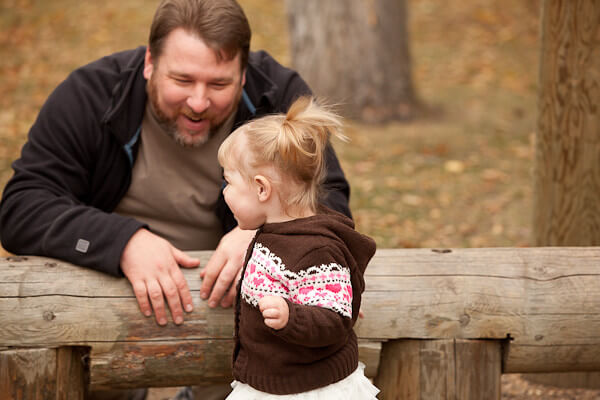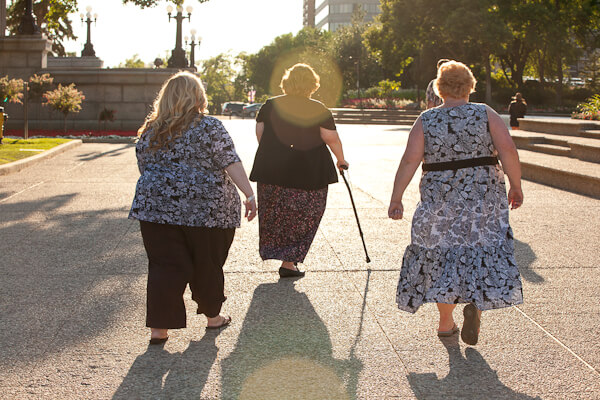5 tips to avoid weight shaming yourself and others
In a society obsessed with monitoring each other’s bodies, avoid contributing to weight stigma when you gather with friends and family
Research tells us weight stigma has a laundry list of negative effects on people in larger bodies, and gathering with friends and family can be especially triggering.
People who might think they have good intentions could still say and do things that are hurtful, harmful, and downright rude that can negatively affect their loved ones—including children.
Dr. Alexa Ferdinands, an assistant professor in health and nutrition who joined Athabasca University’s Faculty of Science and Technology in 2023, has seen this play out in her research into weight stigma. Youth participants reported feeling their bodies were constantly under surveillance growing up, and family gatherings were a prime space for diet-culture conversation.
“For some families and friend groups, big gatherings might only happen a couple times a year. A lot can happen to bodies over the course of a year,” she said. “Our society is obsessed with monitoring and watching each others’ bodies.”
One participant in the research spoke about relatives at holiday gatherings who would comment negatively on their weight, saying things like, “Just because it’s New Year’s doesn’t mean you have to gain everything back.” They felt they couldn’t say anything about the comment because of cultural pressure to not argue with elders.
Ferdinands shared five things to consider when gathering with family and friends to avoid discussing weight and engaging in other weight-shaming behaviour.
1. Give compliments unrelated to appearance
We can be tempted to compliment people by saying things like “you look great,” “it looks like you’ve been working out,” or “have you lost weight?” These kinds of comments suggest certain body types have more inherent value than others.
Instead, frame your compliments and questions more broadly. Complimenting someone by saying “you seem really happy” or “congratulations on your recent achievement.”
“Unfortunately, fat talk is a common part of everyday conversation and functions as a form of social bonding, particularly among girls and women,” Ferdinands said. “Fat talk reinforces societal values of thinness. Kids pick up on this discourse and begin to internalize fatphobia from a very young age.”
2. Avoid discussing diets, calories, or warn of the negative health effects of weight gain
Highlighting the potential negative health effects of overeating, and by extension weight gain, can cause fear and anxiety.
Ferdinands said these kinds of comments do anything but promote health. Rather, they can potentially trigger disordered eating and exercise behaviours rather than having a positive impact.
“The young people I talked to in my research joked about how unhelpful it was being told how to eat and manage their weight by relatives, as if they weren’t already very well aware,” she said.
3. Pushing your guests to eat more (or less) can be weight shaming
It’s none of your business how much or how little the people around you are eating—or what they’re eating. Don’t suggest people should eat more or suggest they should eat less.
Ferdinands said the societal obsession with monitoring what others consume often isn’t even internally consistent.
“Ironically, in my research I heard from participants that their relatives harped on them for not putting enough on their plate, right after they’d just told them they’d gained too much weight,” she said. “It was a lose-lose situation.”
The young people I talked to in my research joked about how unhelpful it was being told how to eat and manage their weight by relatives, as if they weren’t already very well aware. Dr. Alexa Ferdinands
4. Speak up when others make weight shaming comments about body type
If someone makes a comment like “they sure have gained weight,” consider responding by reminding the speaker that someone else’s weight is none of their business, or simply saying it’s not appropriate to discuss someone’s body.
Ferdinands said many people—young people, in particular—can feel hesitant to respond or defend themselves when others make comments about their weight if the speaker is seen as an authority figure.
“Given these power dynamics, young people need other adults to stand up for them,” she said.
5. Provide size-inclusive seating to your guests
No one likes to enter a space feeling unwelcome, so not having somewhere safe and comfortable to sit can be a big stressor for higher-weight people. Consider this when you’re inviting people to your home or to a public venue.
“Some participants in my research described feeling scared to sit down in certain venues, worrying that they would break the couch or chair,” Ferdinands said. “Accessible built environments are so important.”
She recommends looking for chairs with higher weight capacities that don’t have armrests, and looking to companies that provide dining chairs with a high weight capacity.
Learn more about weight stigma
The societal pressure to monitor and comment on each other’s weight is strong, and we might not even realize what we’re doing is potentially harmful to those around us.
Ferdinands recommends learning more about weight stigma with resources shared by Obesity Canada, including a letter to parents written by young people involved in her research. For more in-depth reading, she recommends the recently published books Fat Talk by Virginia Sole-Smith and You Just Need to Lose Weight by Aubrey Gordon.
Learn more about Ferdinands’ research—which focuses on issues like weight stigma, food insecurity, and rural health—on the AU website.

